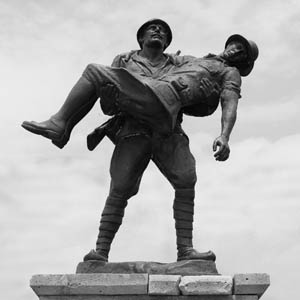Gallipoli at the Santa Barbara Public Library
A Private Affair

The austere quietness of the library befits the contemplation of Gallipoli, an exhibition by local photographer Brett Leigh Dicks. His black-and-white photographs, marching one by one across the spartan walls of the room, act as individual monuments to the eight-month battle fought on the shores of Turkey’s Gallipoli peninsula during World War I. Recognized as a pivotal battle between Australians and Turks, the Gallipoli campaign has become a founding myth for both countries through tales of camaraderie and heroism. In wandering with his camera across the same fields, beaches, and ravines his great-grandfather once did as a soldier in this historic battle, Dicks makes both a public commemoration and a personal investigation into the calamity of war and its aftereffects.
The 45 photographs are minimally shot at deadpan angles; many of them display a purposeful symmetry. More than 90 years after this violent struggle was fought to control a crucial shipping port, the surrounding landscape now bears almost imperceptible bruises and nearly healed scars in the form of crumbling stone overlooks and overgrown trenches. Pieces of war machinery have become integrated into the hillside, and former bunkers sag under the weight of passing time. Some remnants of the war are more subtle: In one photograph, a giant, white stone monument dated simply “1915” designates a particularly crucial moment in the battle. In another, an ancient tree lies in stark contrast against a clear sky. Nondescript in style yet powerful in content, these images are evidence of another battle-the one taking place between humankind and nature, as each claims its stake as a marker of history.
For Dicks, these photographs are part of a personal journey to retrace the steps of his ancestors and experience them firsthand. But for the viewer, Dicks’s investigation goes beyond family legacy, even beyond the Great War. His images remind us of the ancient civilizations that once occupied the land and fought their own battles. They remind us that the grains of sand between our toes and the cool ocean breeze across our faces will continue to exist long beyond our conflicts. They remind us that history is a collective memory haunting us all.



